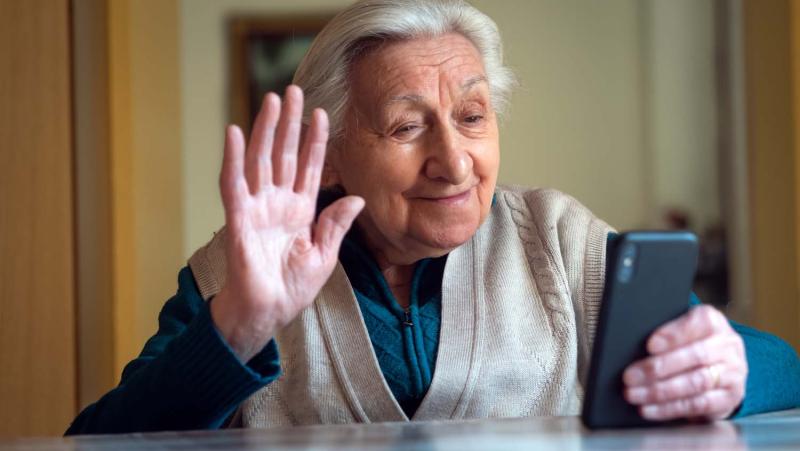Key points
- Information and Communication Technologies (ICT) include a diverse set of technological tools and resources such as computers, internet devices, live broadcasting technologies, recorded broadcasting technologies, and telephones.
- The use of ICT improves social support, social connectedness and social networks of older people in various settings.
- ICT had variable impact on social participation, social isolation and loneliness in older people.
- Human connection is critical at all stages of life, including older age. ICT use can improve human connection but will not completely address problems of social connection and social isolation.
Information and Communications Technology (ICT) brings together telecommunications and modern computing technology. It is defined by the United Nations Educational, Scientific and Cultural Organization as a diverse set of technological tools and resources used to transmit, store, create, share or exchange information. [1] This can include computers, the internet (e.g., websites, blogs, emails etc), live broadcasting technologies (e.g., radio, television and webcasting), recorded broadcasting technologies (e.g., podcasts, audio and video players, and storage devices) and telephone (e.g., fixed or mobile, satellite or video-conferencing). [1]
ICT has been widely used in aged care. The Australian eHealth Research Centre’s work on ‘Health in the Digital Age’ includes storage of health data and data analytics, clinical terminology, use of data for other related purposes, and mobile health solutions such as telehealth.[2] More recently, aged care providers have been trialling assistive and mobile technologies to meet certain needs of the people to whom they provide care and support. [2] ICT has been shown to offer potential advantages such as improving the quality and safety of care and information sharing. [2]
ICT works by helping older people stay connected with family, friends, former colleagues and new contacts. [2, 3] It can also help them engage in hobbies and enjoyable activities. [3]
This evidence theme is a summary of one of the key topics identified by a scoping review of social isolation research. If you need more specific or comprehensive information on this topic, try the PubMed search below.
We found 12 reviews that focused on the use of ICT for older people. [3-14] Various forms of ICT were used to address social isolation alone and the combination of social isolation and loneliness among older people in aged care and community settings. Social isolation and loneliness are two distinct concepts but, in some reviews, loneliness was reported alongside social isolation.
ICTs found in the reviews include:
- Communication programs using landline phones, smartphones, iPads, computers, emails, online chat forum [3-6]
- Applications and gaming systems [3,6,7]
- Radio program [8]
- Virtual companions (pets) [3,4], humanoid animated agents [9]
- Virtual reality [10]
- Social platforms such as networking sites [3,11], online platforms [7,9], social media [12]
- All types of technology [13,14]
Nine reviews considered mixed settings [3, 5- 6, 9 - 14], two in community or home settings [4,7] and one in residential aged care setting. [8] Two of the reviews on mixed settings had a subcomponent analysis focused on social isolation at the time of the COVID-19 pandemic. [5,6]
ICT conducted in mixed settings
In general, ICT interventions conducted in mixed settings were found to improve social support, social contacts, social connectedness and social networks. [3] However, no effect was found on the number of close friends or contacts [3] and social wellbeing. [3,7] Limited and inconclusive evidence was found for social participation, [7,14] loneliness [3,12] and social isolation. [5,6,9,11-13] The limited evidence was mostly due to conflicting findings and the need for well conducted research. However, despite the limited evidence found for social participation, social isolation and loneliness measures, there are some useful feedback from reviews with qualitative studies which were:
- Decrease in loneliness [7]
- Use of social media had the effect of decreasing perceptions of loneliness and/or social isolation. [12]
ICT conducted in community or home settings
ICT interventions conducted in community settings were found to improve social connectedness and social networks. [7] No effect was found on social wellbeing and social participation. [7] Limited and inconclusive evidence, mostly due to conflicting findings and need for well conducted research, were found for social isolation and loneliness. [4,7]
ICT conducted in residential aged care settings
One review, with one primary study on older people in residential settings in Australia and New Zealand reported that a radio programme broadcasting old-time music with listeners calling and giving birthday messages did not have an impact on social isolation of the residents. [8]
ICT use at the time of COVID-19 global pandemic
The two reviews that reported on the use of ICT for older people at the time of COVID-19 pandemic found conflicting results in combatting social isolation. [5,6] Different types of online interventions such as telehealth, online exercises and online social support were found to help address social isolation [5] whilst one-off phone calls had no effect on social isolation. [6]
There are different types of ICTs used within aged care and most of these were examined in the reviews in combination with other types. This variability in different types of ICTs used in aged care resulted in limited analysis and evidence regarding the most effective and preferred type of ICT.
- Always remember that ICT use will not fully address problems of social connection and more so social isolation and loneliness and therefore it should not be used to replace human interaction.
- Encourage individuals working in aged care settings to be knowledgeable in using ICT so they can assist older people if needed.
- Use a strength-based approach where the older person’s strengths, experience and interests are used to encourage and/or teach people to use ICT devices and applications.
- Foster ICT literacy by providing a wide range of opportunities and encouraging older people to learn and/or build capacity and confidence using varying forms of ICT.
- Assess and support the older person’s preferred form of ICT device and the application/s that they believe work best for them to facilitate social connectedness, and information sharing as well as to pursue hobbies and interests.
- Respect that some older people may chose not to use ICT while others, able to use ICT, may have a preference to use more traditional means to communicate/engage with family and friends, always or at special times, and/or with individuals.
- Provide opportunities for both aged care workers and older people to use ICT in the organisation.
- Enhance the organisation’s digital literacy and encourage staff and older people to keep developing their skills.
- Provide a secure and stable internet connection in the aged care facility/service and ensure access details are readily visible within all communal rooms and bedrooms.
- Provide devices such as computer tablets and mobile phones for use by people who do not have their own.
- Provide opportunities for staff training in ICT and how they can respectfully facilitate older people to acquire and/or enhance their knowledge and use of digital technologies.
- If needed, support older people in their use of ICT.
- Provide opportunities for human connection and in addition to ICT use.
- UNESCO International Institute for Educational Planning. Information and Communication Technologies (ICT) [Internet]. n.d. [cited 2023 Oct 20]. Available from: https://learningportal.iiep.unesco.org/en/glossary/information-and-communication-technologies-ict.
- Royal Commission into Aged Care Quality and Safety. ICT strategy and architecture review report [Internet]. The Architecture Practice; 2020 [cited 2023 Oct 20]. Available from: https://agedcare.royalcommission.gov.au/sites/default/files/2020-12/ict-strategy-and-architecture-report_1_0.pdf
- Chen YR, Schulz PJ. The Effect of Information Communication Technology Interventions on Reducing Social Isolation in the Elderly: A Systematic Review. J Med Internet Res. 2016 Jan 28;18(1):e18.
- Poscia A, Stojanovic J, La Milia DI, Duplaga M, Grysztar M, Moscato U, Onder G, Collamati A, Ricciardi W, Magnavita N. Interventions targeting loneliness and social isolation among the older people: An update systematic review. Exp Gerontol. 2018 Feb;102:133-144.
- Rodrigues NG, Han CQY, Su Y, Klainin-Yobas P, Wu XV. Psychological impacts and online interventions of social isolation amongst older adults during COVID-19 pandemic: A scoping review. J Adv Nurs. 2022 Mar;78(3):609-644.
- Todd E, Bidstrup B, Mutch A. Using information and communication technology learnings to alleviate social isolation for older people during periods of mandated isolation: A review. Australas J Ageing. 2022 Sep;41(3):e227-e239.
- Heins P, Boots LMM, Koh WQ, Neven A, Verhey FRJ, de Vugt ME. The Effects of Technological Interventions on Social Participation of Community-Dwelling Older Adults with and without Dementia: A Systematic Review. J Clin Med. 2021 May 25;10(11):2308.
- Chen C, Shannon K, Napier S, Neville S. Loneliness among older adults living in aged residential care in Aotearoa New Zealand and Australia: An integrative review. Nursing Praxis in Aotearoa New Zealand. 2022;38(1):5-15.
- Choi HK, Lee SH. Trends and Effectiveness of ICT Interventions for the Elderly to Reduce Loneliness: A Systematic Review. Healthcare (Basel). 2021 Mar 7;9(3):293.
- Healy D, Flynn A, Conlan O, McSharry J, Walsh J. Older Adults' Experiences and Perceptions of Immersive Virtual Reality: Systematic Review and Thematic Synthesis. JMIR Serious Games. 2022 Dec 6;10(4):e35802.
- Wiwatkunupakarn N, Pateekhum C, Aramrat C, Jirapornchaoren W, Pinyopornpanish K, Angkurawaranon C. Social networking site usage: A systematic review of its relationship with social isolation, loneliness, and depression among older adults. Aging Ment Health. 2022 Jul;26(7):1318-1326
- Kusumota L, Diniz MAA, Ribeiro RM, Silva ILCD, Figueira ALG, Rodrigues FR, Rodrigues RAP. Impact of digital social media on the perception of loneliness and social isolation in older adults. Rev Lat Am Enfermagem. 2022;30:e3573.
- Hoang P, King JA, Moore S, Moore K, Reich K, Sidhu H, Tan CV, Whaley C, McMillan J. Interventions Associated With Reduced Loneliness and Social Isolation in Older Adults: A Systematic Review and Meta-analysis. JAMA Netw Open. 2022 Oct 3;5(10):e2236676.
- Townsend BG, Chen JT, Wuthrich VM. Barriers and Facilitators to Social Participation in Older Adults: A Systematic Literature Review. Clin Gerontol. 2021 Jul-Sep;44(4):359-380.
Connect to PubMed evidence
For more research and information on ICT and social isolation, visit our ‘one-click’ searches on PubMed:

